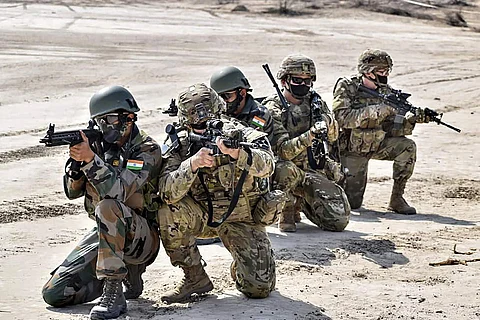

What after National Defence Academy? The candidates who are selected are called for the SSB (Services Selection Board) interview.
At the SSB interview, board members look for Officer-Like Qualities, which the students have to develop by themselves. "There is no coaching for it; we can only guide. Aspirants should start working on themselves for at least a year, as building these qualities takes time," Mohammad Asim, Category Manager and Educator at Physics Wallah, states. He exemplifies his student and NDA (II) 2022 topper Anurag Sangwan, who used to wake up at 5 am daily to get into a habit.
At the SSB exam centre, the thematic tests on the first day include making a story out of words or pictures shown on a screen, describing a picture or making a sentence with a given word in a limited time. "Students are tested for their thinking. They have to maintain a positive mindset and attitude all the time. Any sign of negative thinking leads to rejection," informs Santosh Kumar Mishra, Assistant Master of Mathematics in Sainik School, Bhubaneswar.
Group tests are also conducted during the first day's assessment, one of which is group discussions (GD). Though communication is one of the tested parameters, the conception that good English-speaking skills mean success is wrong, the Sainik School teacher mentions. "We have seen many of our students who were not very good in English selected," he says, adding, "What is important is how you communicate."
He explains that students who speak well tend to dominate or speak more than necessary (beyond their shared time limit of three minutes), which are not good traits of a leader and invite rejection. "Some students who are highly knowledgable are also seen to dominate. However, giving others the chance to speak is also important. You may not agree with them but you should respect others' opinions. If you have the knowledge, very good, but wait for your turn to speak," he advises.
After Day One
Candidates who make it through the first day have to undergo various group tasks in the next four days, during which they are marked for the OLQs on a scale of ten. This is followed by a personal interview on the final day. "It is a conference in which a group of board members ask 10-15 final questions to each of the remaining candidates. Absolute honesty is necessary here. Any type of bluff is immediately caught and leads to rejection. There is no place for overconfidence as well," he says.
Back to the basics
Qualifying the SSB interview means preparing for being a cadet. The experts assert that those who are determined and persistent in their efforts are sure to succeed, as NDA is not an extremely tough exam. However, before worrying about the selection, the first thing students need to ensure is writing the exam well. Basic rules like staying active and eating well for good concentration should not be ignored, stresses Sumit Kumar, Educator at Unacademy for NDA.
"The most important tip for managing anxiety around the exam is to plan well. Once you are at the exam centre, the focus should be 100 per cent on giving your best in the exam. To ensure the exam is off to a great start, mistakes like coming in late to the centre, forgetting your ID, admit card, and pencils and not reading the instructions carefully before starting the exam, need to be avoided," he said.
Determining factors
Sumit further advises that before applying for the NDA, it's essential to be mentally prepared for challenges, given the rigorous nature and demands of cadet life. Additionally, "Stay fit through exercise and training. Believe in yourself, and don't hesitate to ask for help," he tells students.
In case a student is confused about choosing between the Army, Navy and Air Force, Sumit suggests the following:
1. Think about what you like and what you're good at.
2. Learn about different roles and jobs in each branch.
3. Talk to soldiers/armed forces personnel to learn more about their experiences.
4. Watch different podcasts and content across channels to understand more about the life in armed forces.
